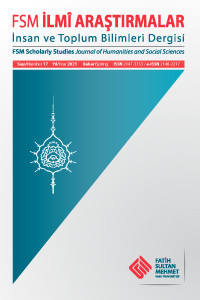Ruhları Konuşturmak: A‘mâk-ı Hayâl, Mezâmîr-i Felsefeden İnsaniyete Veche Veren Büyük Ruhlar ve Rü’ya’nın Spiritüalist Kökleri
Filibeli Ahmed Hilmi’nin A‘mâk-ı Hayâl’i, Tahir Harîmî Balcıoğlu’nun Mezâmîr-i
Felsefeden İnsaniyete Veche Veren Büyük Ruhlar’ı ve Cafer Ergin’in Rü’ya adlı eserleri
modern spiritüalizmin kurucusu Allan Kardec’in düşüncelerinden belirgin izler taşır.
Spiritüalizmin etkisi, bu üç eserde de rüya içerisinde büyük ruhların konuşturulmasına
dayanan ortak bir anlatım tarzının kullanılmasını sağlamıştır. Bu anlatım tarzının
en büyük özelliği, ruhu ve ruh kavramının dinî ve felsefî muhtevasını bizzat ruhların
kendisine söyletmektir. Bu tür eserler içinde en bilineni olan A‘mâk-ı Hayâl, Filibeli Ahmed
Hilmi’nin ruhun varlığına dair yaşadığı tereddütlerden sonra onun varlığına ikna
olduğu spiritüel tecrübelere dayanmaktadır. Aynı şekilde Tahir Harîmî de kendisine anlatılan
spiritüel bir tecrübeden yola çıkarak eserini kaleme almıştır. Bu çalışmada ilk olarak
Filibeli Ahmed Hilmi ve Tahir Harîmî’nin kitaplarını kaleme almadan evvel yaşadıkları
ruhî hadiselere yer verilmiş ve her iki yazarın da spiritüalizmle olan ilişkisi gösterilmeye çalışılmıştır. Filibeli Ahmed Hilmi’nin ruha dair düşüncelerinin değişimi, Şehbal dergisinde
yayınladığı hatırat özelliği gösteren “Eski Fikirler, Yeni Şekiller: Ulûm-ı Garîbe ve
İspitirizma” başlıklı yazılarından yararlanılarak ortaya konulmuştur. Daha sonra Allan
Kardec tarafından kaleme alınan Ruhlar Kitabı’nın bahsi geçen üç eser üzerindeki tesiri
irdelenmiştir. Bu tesir; eserlerin yazılış amacı, ruh, rüya ve Hz. Peygamber vurgusu
başlıkları altında incelenmiş ve bu başlıklarla ilgili eserlerden alınan örneklere yer verilmiştir.
Anahtar Kelimeler:
A‘mâk-ı Hayâl, Mezâmîr-i Felsefeden İnsaniyete Veche Veren Büyük Ruhlar, Rü’ya, ruh, spiritüalizm
To Make Spirits Talk: Spiritualist Roots of A‘mâk-ı Hayâl, Mezâmîr-i Felsefeden İnsaniyete Veche Veren Büyük Ruhlar and Rü’ya
Filibeli Ahmed Hilmi’s A‘mâk-ı Hayâl, Tahir Harîmî Balcıoğlu’s Mezâmîr-i Felsefeden
İnsaniyete Veche Veren Büyük Ruhlar, and Cafer Ergin’s Rü’ya have clear traces
of the thoughts of Allan Kardec, the founder of modern spiritualism. The influence of
spiritualism has resulted in the use of a common narrative style in these three works,
which is centered around the communication of great spirits through dreams. The most
important feature of this style of expression is that the spirits themselves tell the spirit and
the religious and philosophical content of the concept of spirit. A’mâk-ı Hayâl, which is
the most well-known among such works, is based on the spiritual experiences of Filibeli
Ahmed Hilmi, was initially hesitant about the existence of the soul, but eventually became
convinced through his experiences. Likewise, Tahir Harîmî wrote his work based on
a spiritual experience told to him. In this study, firstly, the spiritual events experienced by
Filibeli Ahmed Hilmi and Tahir Harîmî before they wrote their books are included and
the relationship of both authors with spiritualism is tried to be shown. The change of Filibeli
Ahmed Hilmi’s thoughts on the soul is revealed by utilizing his memoirs published
in Şehbal magazine titled “Eski Fikirler, Yeni Şekiller: Ulûm-ı Garîbe ve İspitirizma”, a
memoir published in Şehbal magazine. Later, the effect of The Spirits Books, written by
Allan Kardec, on three works mentioned was examined. This effect is examined under
the titles of the purpose of writing, spirit, dream and Prophet Muhammad emphasis and
examples taken from the works about these titles are given.
Keywords:
spirit, spiritualism,
- ISSN: 2147-3153
- Başlangıç: 2012
- Yayıncı: Fatih Sultan Mehmet Vakıf Üniversitesi
Sayıdaki Diğer Makaleler
Kur’an Kıssaları Bağlamında İki Bahçe Sahibi ve Arkadaşı
Birinci Dünya Savaşı ve Kıbrıs
Popüler Kültür ve Tasarım İlişkisi Ekseninde “Piyasa” İçin Siyer/ Siyer Konulu Romanlar
Okul Öncesi Dönem Çocukların Mekânda Konumla İlgili Kavramları Kullanma Düzeylerinin İncelenmesi
Mehmet MART, Fatma ALİSİNANOĞLU, Oğuz Serdar KESİCİOĞLU, Şule ERŞAN
Ni’metullâhiyye Tarîkatına Yönelik Farsça Bir Tarîkatnâme: Tarîka Fî Âdâbi’s-Sülûk
Evliya Çelebi Seyahatnâme’sinde Tılsımlar
Veliaht Abdülmecid Efendi’nin Sofrasından Son Dönem Osmanlı Saray Mutfak Kültürü
